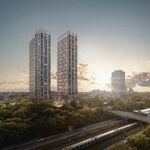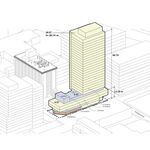There is no righteous ire like the ire of people who believe they deserve something for nothing. In that light, don't expect many motorists to appreciate Donald Shoup's new book, The High Cost of Free Parking.
An UCLA professor in the Department of Urban Planning, Shoup dissects the economic, social, and environmental impacts of current parking regulations and proposes a new approach that can help free cities from the pernicious effects of auto dependency.
Originally limited to the curbside, parking was destined to become a scarce resource. Cars take up a lot of space, the total area of curbside parking is limited, and certain areas, like workplaces and commercial districts, experience peaks in demand when large numbers of people arrive at once.
Planners concluded that the solution was physical: create enough additional parking to offset the projected increase in demand. What seemed like good public policy at the time has been a slow-motion time bomb for cities. Too much parking is much worse, in the long run, than not enough parking.
When planners calculate how many parking spaces to provide1, they assume parking is free. Obviously, demand for a "free" service will be much higher than demand for a service that must be purchased. If people don't have to pay for parking, they are much more likely to drive.
There's just one problem: parking isn't free. In fact, according to Shoup, "the cost of all parking spaces in the U.S. exceeds the value of all cars and may even exceed the value of all roads." Parking costs billions of dollars a year.
Shoup is an economist, and it shows in the perspective he brings to bear. "[E]conomists do not define the demand for food as the peak quantity of food consumed at free buffets." Nevertheless, planners define the demand for parking as the peak quantity of spaces used when parking is free.
Developers simply pass the cost of "free" parking to property owners, who pass it to tenants, who pass it to all customers in the form of higher prices. "Off-street parking requirements encourage everyone to drive wherever they go because they know they can usually park free when they get there."
Huge expanses of asphalt push buildings far back from the street and away from each other. "Free" parking increases demand for driving lanes, which further separates destinations, making it difficult to get anywhere without a car. This further increases demand for more lanes and more parking in an insidious positive feedback loop.
Markets normally use price signals as negative feedback to contain demand. When demand goes up, the price goes up, and the higher price lowers demand. However, for price signals to work, the people using a good or service must be the ones paying for it.
By breaking the relationship between use and payment, "free" parking eliminates the negative feedback that keeps the system in balance. As a result, everyone decides to drive everywhere, and the car crowds out other forms of transportation.
Even paid parking is often underpriced. In Hamilton, for example, motorists can park for 50 cents an hour at most curbside meters. Assuming about 60 square feet for a parking spot, that's six dollars per square foot per month - an order of magnitude lower than the equivalent monthly cost for a square foot of building space.
The tantalizing promise of underpriced parking leads motorists to cruise around the block until a spot opens up. In studies Shoup cites that analyzed traffic congestion, 30 percent of cars on the road were trying to find a parking spot.
Of all the transport systems available, including public transit, shipping, and rail, cars are unique in that terminal costs (doing something with your vehicle when the trip is finished) are offset to the rest of the economy. This "provide a huge subsidy to motorists, and thus increase the demand for cars, parking spaces, and vehicle travel."
Only walking, which has effectively no terminal costs, is comparable. All things being equal, most people would rather drive than walk. The problem is that all things aren't really equal; parking requirements just make it seem that way.
Worse still, "free" parking provides the biggest per-mile subsidy to the shortest trips, meaning drivers have a major incentive to drive to destinations they would otherwise be able to reach with ease by foot or bicycle. A huge proportion of traffic congestion is made up these short trips.
Shoup concludes cities should eliminate zoning requirements for off-street parking, end free municipal parking, and charge whatever price will maintain about 15 percent vacancy - the optimal rate to ensure easy entry and exit. To balance variable demand against a fixed supply, he recommends setting different prices according to time of day and day of week.
Anticipating the righteous ire of those drivers accustomed to free parking, Shoup notes that the biggest barrier to eliminating this subsidy is political, not technical, and proper implementation is critical.
The best way to implement market priced parking is for cities to remit all of the revenues from parking to what he calls "parking benefit districts", akin to business improvement areas. This way, decisions on how to collect and how to spend are made by the citizens most affected.
The benefits are potentially tremendous: with less parking, there is more room for both people and businesses, and the right balance between supply and demand means less congestion from cruising, less noise, and less air pollution. Reduced parking requirements also ease entry for investors who might otherwise build elsewhere. As the area becomes more appealing to pedestrians, it attracts both visitors and investors.
For Hamilton in particular, this kind of arrangement can provide the momentum and investment to restore and revitalize our beautiful downtown neighbourhoods that preceded cars and are already designed with pedestrians in mind.





